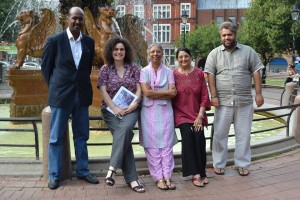Log into the Mentor area to access downloads (Please note that you need to be a trained mentor to access this area. If you would like to become a mentor or have forgotten your log-in please email us).
Go to the Mentor Map to find a mentor who can work with you.
Apply to become a mentor
If you are interested in becoming a mentor, please download, complete and return the mentors’ application form below:
To become fully accredited a mentor must complete two training days and demonstrate the support they have given to at least one supplementary school to prepare for quality recognition. Mentors who have worked in schools and local authorities and those who have experience of the learning environment, classroom management, and teaching and learning are encouraged to become fully accredited. We are happy to receive applications from mentors with experience of organisational management and governance to mentor to support organisations with their governance and safeguarding practice in which case only they need complete only the first training day. Once you become fully accredited, you need to work with at least one school and attend one refresher training day per year to maintain your status.
Training
NRCSE Quality Assurance mentor training – 2018
Resource for London,
Day 1, 10 January 2018 Day 2, tbc March 2018
Go to the online shop to book a place at mentor training
• Day 1 This prepares people to support supplementary schools to put in place the policies and procedures necessary to run safe and effective out-of-school provision. Supplementary schools are not subject to the legislation governing statutory provision, but they must adhere to safeguarding guidelines and good practice and if they are commissioned in anyway by statutory agencies they must demonstrate that they meet the standards for VCS organisations working with children and young people as noted in Working Together 2015, and Section 11 of the Children Act 2004. The role is, therefore, most suitable for those who are employed within statutory or voluntary sector agencies to support community initiatives and/or educational attainment.
• Day 2 Local authority staff and NRCSE Mentors who have completed Day 1 are encouraged to attend this course. It will enable them to support supplementary schools to gain the NRCSE Quality Mark and recognition of the teaching and learning taking place in their schools. Upon successful completion of both mentor training days and moderation of support through the NRCSE quality recognition scheme, mentors can apply to join NRCSE’s list of recommended ‘quality assurance mentors’.
Mentors and supplementary schools are issued with a complementary copy of our Quality Assurance manual, ‘How to deliver quality supplementary education’ and have access to both the safeguarding quiz and the online self-assessment tool as well as over 100 downloadable resources that they can refer to about any areas that are unfamiliar to them. The NRCSE organises training for supplementary schools to support safe practice, good governance and quality assurance, and this can be arranged regionally. View the training for schools we have available.
For schools looking for support
Go to the Mentor Map to find a Quality Assurance Mentor who can work with you.
For supplementary schools looking for support to guide them through the NRCSE quality assurance scheme we have a register of NRCSE accredited mentors working across England. In many areas this support is funded by the local authority or by charitable trusts and available free of charge to community organisations, in other areas a fee may be charged for support. Please get in touch for advice on available support in your area.

Mentor Refresher Training
From September 2017, mentors who trained before 2017 are no longer be able to submit witness statements or recommendations until they re-train. All mentors must attend an annual refresher day. Next mentor refresher training will be in December 2017, let us know if you’re interested.
Mentor Refresher Day. This essential training covers the Code of Practice, the online self-assessment tool, supporting the building of a higher level portfolio, what to expect at a recognition meeting and an update on the Quality Mark recognition process, complaints and appeals.
